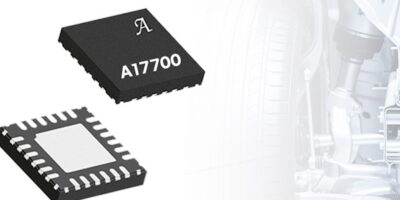Automotive sensor interface IC has flexible interface options
A sensor interface IC released by Allegro MicroSystems offers high accuracy and output flexibility for resistive bridge pressure sensors. The A17700 delivers fast, reliable, and flexible output with signal conditioning algorithms for automotive and industrial pressure sensing applications.
The automotive-grade interface IC uses flexible compensation algorithms for accuracy over temperature and sensing bridge variation. It also features pressure information delivery in low delay analogue, PWM, or SENT outputs.
“The A17700 allows system designers to easily select the optimal algorithm and I/O options that best fit their system requirements, balancing accuracy and end-of-line test times, thereby optimising the system cost,” explains Haeyoung Choi, product manager for Sensor Interface ICs at Allegro.
The sensor interface IC is qualified to AEC-Q100 Grade 0.
The A17700 is configurable for resistive bridge pressure sensors in a range of critical applications in today’s vehicles. These range from high-pressure systems, for example, dynamic brake systems (DBS) in turbo and hybrid electric vehicles (HEV) or gasoline direct injection (GDI) to medium and low pressure systems such as brake boosters, HVAC applications for electrified vehicles, and automatic transmission oil management.
Described as having best in class integrated polynomial algorithm, the A17700 interface sensor offers accuracy over pressure and temperature through two-stage processing of a pressure signal. This compensation delivers high accuracy in resistive membranes requiring either high- or low-point characterisation during assembly, explains Allegro.
The A1770 has a robust EMC performance (up to 4kV HBM) and also enables up to 30 per cent fewer external components. This is particularly advantageous for use in space-constrained applications, such as vehicles and some industrial applications.
The parallel processing paths for input and temperature, allow the A17700 to achieve the smallest chip delay on the market, claims Allegro. With an input-to-output processing delay of 100 microseconds, the fast interface sensing IC allows systems to compensate for vibration effects on the membrane with no output resolution loss, to increase system fidelity.
“This enhanced ability to report the oscillations will confirm that the appropriate filtering is applied and offer customers trusted reliability and performance,” added Choi.
Environmental conditions, such as a change in supply voltage level, temperature, input bridge signal, and connection, can cause temporary faults in pressure sensing systems. The A17700 captures these changes and signals them in the output protocol, enabling fault filtering at the system level for more accurate safety notifications.
The A17700 is available in a small form factor 24-pin 4.0 x 4.0mm QFN package with wettable flanks for reliable soldering and visual inspection of solder joints.




